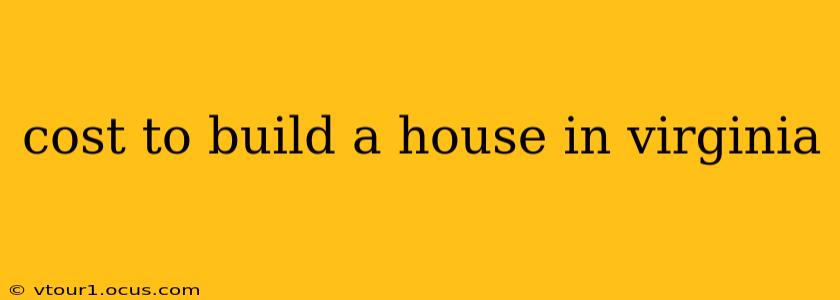Building a house is a significant undertaking, both emotionally and financially. The cost to build a house in Virginia varies considerably depending on a multitude of factors. This guide breaks down the key elements influencing the price and provides you with the tools to estimate your own project's cost.
What Factors Influence Building Costs in Virginia?
Several key variables significantly impact the final price tag of your Virginia home build:
-
Location: Building in a rural area will generally be cheaper than constructing in a bustling city or a highly desirable coastal region. Land costs and labor rates fluctuate across Virginia. Northern Virginia, for example, commands significantly higher prices than Southwest Virginia.
-
Size and Design: A sprawling 5,000 square foot home will naturally cost far more than a modest 1,500 square foot ranch. Complex architectural designs, intricate detailing, and custom features all add to the overall expense.
-
Materials: The choice of building materials dramatically influences cost. Luxury finishes like high-end cabinetry, imported stone, or exotic hardwood flooring will escalate the budget compared to more economical options. Similarly, the type of roofing, siding, and windows all play a role.
-
Labor Costs: The cost of skilled labor varies across Virginia and is subject to market fluctuations. A shortage of skilled tradespeople in certain areas can drive up labor costs.
-
Permits and Fees: Securing the necessary building permits and paying associated fees is a non-negotiable expense. These costs can vary depending on the local jurisdiction.
-
Unexpected Issues: Unforeseen circumstances, such as unexpected soil conditions requiring foundation adjustments or changes in material availability, can lead to cost overruns. A contingency budget is crucial.
-
Home Features: Incorporating smart home technology, energy-efficient systems, or a swimming pool will substantially increase the overall cost.
How Much Does it Cost to Build a House in Virginia? (Average Estimates)
Providing a precise cost per square foot is difficult due to the variability mentioned above. However, general estimates suggest that building costs in Virginia range from $150 to $350+ per square foot. This broad range reflects the diverse factors previously discussed. A more realistic approach involves breaking down the costs into individual components:
Land Costs:
This varies wildly depending on location and size. Rural land is generally more affordable than urban or coastal properties. Expect to budget significantly for this aspect, as it often comprises a substantial portion of the total project cost.
Construction Costs:
This encompasses the bulk of the expense, including:
- Foundation: This includes excavating, pouring the foundation, and building the basement (if applicable).
- Framing: The structural lumber and construction of the house's frame.
- Roofing: Material costs and labor for installing the roof.
- Exterior Finishes: Siding, windows, and doors.
- Interior Finishes: Drywall, flooring, cabinetry, fixtures, and appliances.
- HVAC and Plumbing: Heating, ventilation, air conditioning, and plumbing systems.
- Electrical Work: Wiring and electrical fixtures.
Contingencies & Unexpected Costs:
Always include a contingency buffer (typically 10-20%) to account for unforeseen delays, material cost increases, or necessary changes during construction.
What are the steps to building a house in Virginia?
This is a complex process involving multiple steps:
- Land Acquisition: Finding and purchasing a suitable plot of land.
- Design & Planning: Working with an architect or designer to create plans and obtain necessary permits.
- Financing: Securing construction financing.
- Construction: Hiring a general contractor and overseeing the building process.
- Inspections: Ensuring compliance with building codes through regular inspections.
- Final Walkthrough & Closing: Completing a final inspection and transferring ownership.
What are common mistakes to avoid when building a house in Virginia?
- Underestimating Costs: Always build a detailed budget and include a healthy contingency.
- Lack of Planning: Thorough planning is key to avoid costly delays and changes during construction.
- Rushing the Process: Allow sufficient time for each stage of the project.
- Poor Communication: Maintain clear communication with your architect, contractor, and other professionals.
- Neglecting Permits: Ensure you have all necessary permits before commencing construction.
This guide provides a starting point for understanding the cost of building a house in Virginia. Remember to consult with local professionals for accurate cost estimates based on your specific project requirements. The more research and planning you do upfront, the smoother and less stressful your building experience will be.
